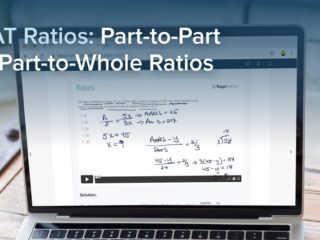Last Updated on May 9, 2023
GMAT OFFICIAL GUIDE DS
Solution:
We are given that r and s are both roots of the equation x^2 + bx + c = 0, where b and c are constants. We must determine whether rs < 0. To better understand how r and s play a role in the quadratic x^2 + bx + c = 0, let’s go through an example of a quadratic using some real numbers.
x^2 – 2x – 24 = 0
Remember, to factor the given quadratic expression, we need two numbers that multiply to -24 and sum to -2.
We see that the two numbers that sum to -2 and multiply to -24 are -6 and 4.
(x – 6)(x + 4) = 0
x = 6 or x = -4
Thus, we can say that 6 and -4 are the roots of the quadratic x^2 – 2x – 24 = 0. Furthermore, the product of the roots of the quadratic x^2 – 2x – 24 = 0 is negative.
We can generalize this result to say that, in order for the product of the roots to be less than 0 (i.e., rs < 0), then the value of the constant c must also be negative.
Statement One Alone:
b < 0
Because b, the coefficient of the x term in the quadratic x^2 + bx + c = 0, can be either negative or positive, we have no information about the value of c.
We can eliminate answer choices A and D.
Statement Two Alone:
c < 0
Since c is less than zero we know that the product of r and s is also less than zero. Statement two is therefore sufficient.
Answer: B



